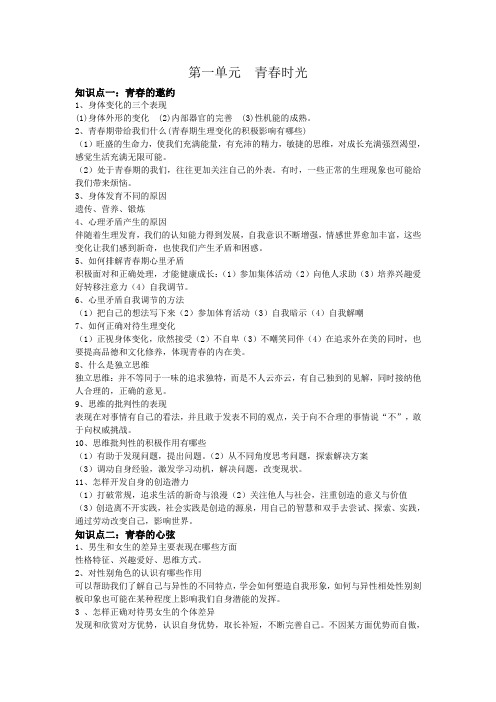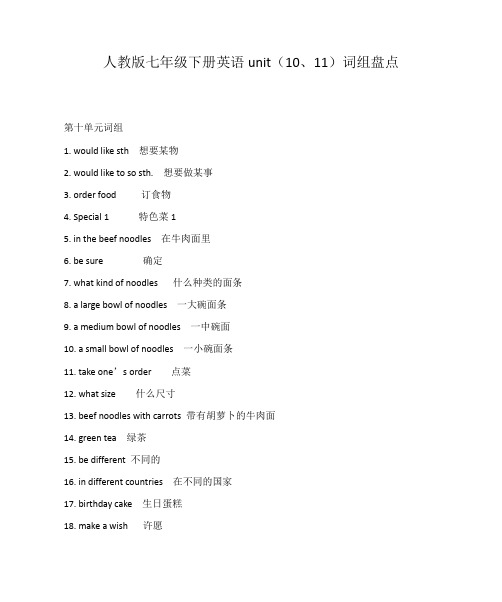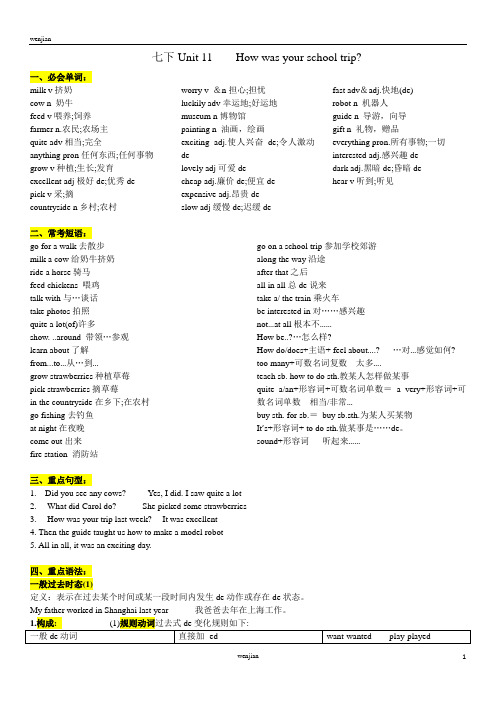人教版七下第十一单元知识点
- 格式:doc
- 大小:27.50 KB
- 文档页数:4

人教版七年级英语下册第十一单元短语语法归纳练习第一部分【重点短语】给奶牛挤奶去钓鱼骑马喂鸡go for a walk show sb. aroundquite a lot/quite a lot of+n.learn a lot about sth. grow strawberriespick strawberries pick uptake sth. home in the countrysideworry+that从句 worry about ……/beworried about ……last week come out It was so much fun. have so much fun. an art museum the science museumgo on a trip along the waymake a model robot buy sth. for sb.= buysb. sth.all in all it’s difficult(for sb.) to do sth.not at all be interested in(doing)sth.【答案】从左至右:milk a cow; go fishing; ride a horse; feed chickens; 去散步=take a walk;带领某人参观;相当多的;关于…学到很多;种草莓;摘草莓;捡起/接某人;带…回家; 在农村;担心……; 担心某人某事;上周;出来/出版/开花;如此有趣;玩得非常开心;一个艺术博物馆;科学博物馆;去旅行;沿途;制作一个机器人模型;为某人买某物;总之;对某人来说做某事很困难;根本不/一点也不;对(做)…感兴趣第二部分【重点语法】一、一般过去时1.定义一般过去时表示过去某个时间或一段时间内发生的动作或状态;也可表示过去经常或反复发生的动作。
e.g.I got up at 7:00 yesterday. 我昨天7点起床。

第一单元青春时光知识点一:青春的邀约1、身体变化的三个表现(1)身体外形的变化 (2)内部器官的完善 (3)性机能的成熟。
2、青春期带给我们什么(青春期生理变化的积极影响有哪些)(1)旺盛的生命力,使我们充满能量,有充沛的精力,敏捷的思维,对成长充满强烈渴望,感觉生活充满无限可能。
(2)处于青春期的我们,往往更加关注自己的外表。
有时,一些正常的生理现象也可能给我们带来烦恼。
3、身体发育不同的原因遗传、营养、锻炼4、心理矛盾产生的原因伴随着生理发育,我们的认知能力得到发展,自我意识不断增强,情感世界愈加丰富,这些变化让我们感到新奇,也使我们产生矛盾和困惑。
5、如何排解青春期心里矛盾积极面对和正确处理,才能健康成长:(1)参加集体活动(2)向他人求助(3)培养兴趣爱好转移注意力(4)自我调节。
6、心里矛盾自我调节的方法(1)把自己的想法写下来(2)参加体育活动(3)自我暗示(4)自我解嘲7、如何正确对待生理变化(1)正视身体变化,欣然接受(2)不自卑(3)不嘲笑同伴(4)在追求外在美的同时,也要提高品德和文化修养,体现青春的内在美。
8、什么是独立思维独立思维:并不等同于一味的追求独特,而是不人云亦云,有自己独到的见解,同时接纳他人合理的,正确的意见。
9、思维的批判性的表现表现在对事情有自己的看法,并且敢于发表不同的观点,关于向不合理的事情说“不”,敢于向权威挑战。
10、思维批判性的积极作用有哪些(1)有助于发现问题,提出问题。
(2)从不同角度思考问题,探索解决方案(3)调动自身经验,激发学习动机,解决问题,改变现状。
11、怎样开发自身的创造潜力(1)打破常规,追求生活的新奇与浪漫(2)关注他人与社会,注重创造的意义与价值(3)创造离不开实践,社会实践是创造的源泉,用自己的智慧和双手去尝试、探索、实践,通过劳动改变自己,影响世界。
知识点二:青春的心弦1、男生和女生的差异主要表现在哪些方面性格特征、兴趣爱好、思维方式。


wenjianwenjian 1 七下Unit 11 How was your school trip?一、必会单词:milk v 挤奶 cow n 奶牛 feed v 喂养;饲养 farmer n.农民;农场主 quite adv 相当;完全 anything pron 任何东西;任何事物 grow v 种植;生长;发育 excellent adj 极好de;优秀de pick v 采;摘 countryside n 乡村;农村 worry v &n 担心;担忧 luckily adv 幸运地;好运地 museum n 博物馆 painting n 油画,绘画 exciting adj.使人兴奋de;令人激动de lovely adj 可爱de cheap adj.廉价de;便宜de expensive adj.昂贵deslow adj 缓慢de;迟缓defast adv &adj.快地(de)robot n 机器人guide n 导游,向导gift n 礼物,赠品everything pron.所有事物;一切 interested adj.感兴趣dedark adj.黑暗de;昏暗dehear v 听到;听见二、常考短语:go for a walk 去散步 milk a cow 给奶牛挤奶 ride a horse 骑马 feed chickens 喂鸡 talk with 与…谈话 take photos 拍照 quite a lot(of)许多 show. ..around 带领…参观 learn about 了解 from...to …从…到… grow strawberries 种植草莓 pick strawberries 摘草莓 in the countryside 在乡下;在农村 go fishing 去钓鱼 at night 在夜晚 come out 出来 fire station 消防站go on a school trip 参加学校郊游along the way 沿途after that 之后all in all 总de 说来take a/ the train 乘火车be interested in 对……感兴趣not …at all 根本不……How be..?…怎么样?How do/does+主语+ feel about ….? …对…感觉如何? too many+可数名词复数 太多….teach sb. how to do sth.教某人怎样做某事quite a/an+形容词+可数名词单数= a very+形容词+可数名词单数 相当/非常…buy sth. for sb.= buy sb.sth.为某人买某物It ’s+形容词+ to do sth.做某事是……de 。

第一单元(重点短语)1.弹吉他2.拉小提琴3.打鼓4.弹钢琴5.下棋6.打篮球7.踢足球8.打网球/排球9.说英语10.讲汉语11.想要做某事12.参加……俱乐部/兴趣小组13.喜欢做某事14.擅长做…精通…15.讲故事16.听起来不错17.让某人做某事18.校园文艺演出招募学生学员19.你会做什么20.和某人交谈21.谈论某事22.放学后23.课后,课余时间24.在音乐室里25.使(中国)功夫,表演(中国)功夫26.来展示给我们看看27.和某人一起做游戏28.为老人提供帮助29.招聘音乐教师(广告语)30.用英语在运动方面为人们提供帮助31.忙碌32.有空33.讲英语的学生34.需要某人做某事35.帮助某人做某事36.给某人拨打电话37.在老人的家里38.善于和某人相处39.告诉某人某事40.(和某人)结交朋友41.在周末42.教某人某事43.参加我们的校园音乐节44.辅导数学1.几点钟2.去上学3.去工作4.起床(晚)5.穿衣服6.刷牙7.吃早饭8.洗淋浴9.在大约六点半10.11点整11.一份有趣的工作12.在广播电台13.从…到…14.在晚上15.那个时间吃早饭真逗16.迟到17.我上班从不迟到18.在周末19.在上学的日子里,在平时20.在早上/下午/晚上21.三点一刻22.六点四十五23.做作业 24.回家25.散步,走一走26.上床睡觉(早)27.吃的快(副词修饰动词)28.做运动,锻炼29.招聘音乐教师(广告语)30.有时我打半个小时篮球(for+时间段)31.到达32.到家/到那儿33.要么…要么;或者…或者…34.看电视35.玩计算机游戏36.吃丰盛的早餐37.许多…38.对…有益处39. 对…有害处40.味道好极了41.为某人制作某东西42.为我做早饭43……声音44.有一个健康的生活方式45.给你衣服(倒装句)晚上我要么看电视,要么玩游戏为了拥有一口好牙齿,吃完东西之后你需要刷牙从周一到周五我没有时间打扫房间(不定时短语作定语)1.到校2.乘火车/公共汽车/地铁去……3.骑自行车去……4.不行上学……5.每天6.每个上学日7.多远8.多长(时间或距离)9.我不是很肯定/我把我不大10.公交车旅程11.做某事花费某人多长时间12.乘……13.它是一种很好的锻炼14.玩得高兴,过得愉快15.在学校16.开车去上班17.它距离学校大约五公里远18.公交停靠点19.汽车站20.火车站21.地铁站23.认为;想起;考虑23.你觉得……怎么样24.横穿河流去学校25.在中国的一个小乡村26.在……和……之间27.在一根钢索上28.一个十一岁大的孩子29.害怕……30.害怕做某事 31.喜爱做某事32.和…一起玩33……中的许多34.离开乡村35.离家/毕业36.实现37.村民们的梦想38. 为什么不?39.不得不40.谢谢41.到那儿42.和某人交谈43.我的最后一个问题44.一年一两次对许多学生来讲到达学校很容易河水流动很急,船只无法通过1.在课堂上2.校规;校园规章制度3.图书馆制度4.上课迟到5.必须守时6.在/走廊/教室/餐厅里7.在户外听音乐8.在音乐室里;在歌厅里9.戴帽子10.穿校服11.和某人打架12.……中的一些13. ……中的一个14.把……带到……15.不得不16.我明白了。

人教版初中英语七年级下册十一单元讲义教案UNIT11第一部分【重点短语】给奶牛挤奶去钓鱼骑马喂鸡go for a walk show sb. aroundquite a lot/quite a lot of+n.learn a lot about sth. grow strawberriespick strawberries pick uptake sth. home in the countrysideworry+that从句worry about ……/be worried about ……last week come outIt was so much fun. have so much fun.an art museum the science museumgo on a trip along the waymake a model robot buy sth. for sb.= buy sb. sth.all in all it’s difficult (for sb.) to do sth.not at all be interested in (doing)sth.【答案】从左至右:milk a cow; go fishing; ride a horse; feed chickens; 去散步=take a walk;带领某人参观;相当多的;关于…学到很多;种草莓;摘草莓;捡起/接某人;带…回家; 在农村;担心……; 担心某人某事;上周;出来/出版/开花;如此有趣;玩得非常开心;一个艺术博物馆;科学博物馆;去旅行;沿途;制作一个机器人模型;为某人买某物;总之;对某人来说做某事很困难;根本不/一点也不;对(做)…感兴趣第二部分【重点语法】一、一般过去时1.定义一般过去时表示过去某个时间或一段时间内发生的动作或状态;也可表示过去经常或反复发生的动作。
e.g.I got up at 7:00 yesterday. 我昨天7点起床。
Unit11 How was your school trip?1.fed chickensfed 为feed的过去式译为:饲养、喂养用法:feed...on... 用...喂养...feed...to...把...喂给...feed on ...(动物)以...为主食Eg:I sometimes feed the carrot to the rabbit.She feeds the dog on meat.The horse feeds on grass.2.I saw quite a lot.a lot:许多,大量(此处作宾语)还可作表语Eg:There is a lot to do.辨析:a lot,a lot of, lots ofa lot of:许多;大量=lots of (后接可数名词复数/不可数名词) 辨析:quite &veryquite:(adv)十分,非常(修饰adj/adv)very:(adv)很,非常语气较quite重(修饰adj/adv)注意:quite &very与不定冠词连用时的位置不同:a+very+adj+n quite+a(n)+adj+nEg:a very handsome boy quite a handsome boya very interesting story quite an interesting storyEg:She sings quite well. He is quite a kind boy.This kind of fruit is very healthy. Thank you very much.3.Did you learn anything?辨析:anything&somethinganything:(不定代词)任何事物;某事物(常用于否定句/疑问句中) something:(不定代词)某事(常用于肯定句中) 但是在表示请求、建议、或征求意见的疑问句中常用something注意:(1)adj修饰不定代词,要位于其后(2)不定代词作主语时,谓语动词用单数形式(3)补充其他不定代词some any no every/body thing oneEg:There isn’t anything wrong.There is something wrong with my puter.4.The farmer showed Carol around the farm.farmer:(n)农民farm:(n)农场;(v)干农活farming:(不可数n)农事Eg:The farmers are working on the farm,and there is too much farming.show sb.around...带某人到处参观...Eg:The guide shows us around the museum.与show相关的短语:show sb.sth=show sth.to sb.给...看展示on show 展览show off 炫耀show up出现5.The farmers don’t grow apples.grow:(vt)种植;栽培(vi)生长;发育Eg:Farmers in the south of China mainly grow rice.Everything begins to grow in spring.短语:grow up成长,长大grow into成长为;发展成(由一种情况变成另外一种情况)Eg:I want to be a guide when I grow up.She grows into a lovely girl.辨析:grow&plantgrow: 种植(强调过程/状态)plant:(v)种植(仅表示栽入土中,表示动作)(n)植物Eg:The farmers grow a lot of trees every year.The farmers plant lots of trees every year.There are many different plants in the garden.6....we worried it would rain.worry:(vt)担心;担忧后常接宾语从句Eg:His parents worry that their child will sick.(vt)使担心;使发愁(常接sb.作宾语)Eg:The naughty boy worries his parents.worry about sb./sth.=be worried about sb./sth. 担心某人/某事Eg:Don’t worry about me ./Don’t be worried about me.7.Luckily,it didn’t,and the sun came out again.(1)luckily(adv)幸运地常用于句首,用逗号隔开unluckily不幸地unfortunately fortunate(adj)幸运的fortunately(adv)幸运地以辅音字母+y结尾的形容词变成副词的方法:改y为i再加ly Eg:happy lucky busy angry easy(2)sun moon earth star 都是世界上独一无二的事物,前面必须加the(3)e out出来;发芽;开花;出版与e相关的短语:e from来自 e on加油;快点 e back 回来e down 下来 e in 进来 e up with 提出;想出;赶上e across遇到8.expensive/cheapexpensive/cheap只能形容事物的贵贱;当谈论价格(price)时,只能用high/lowEg:The pen is cheap.=The price of the pen is low.9.All in all,it was an exciting day.all in all:总的来说;总之in a word:简言之in short:总之Eg:All in all, it’s good for you to do more exercise.辨析:all in all, in all,at allall in all:总的来说(常用于句首)eg:All in all, we had a good time. in all:总共;合计(句首/句末)eg:There are fifty students in all.at all:根本常用于“not at all”根本不Eg:He doesn’t like apples at all.与all相关的短语:all the time 一直after all 毕竟10.I didn’t like the trip at all.Not at all 用于回答感谢/道歉Eg:Thank you very much.Not at all.其它的回答:It’s my pleasure. It’s a pleasure. No problem.You’re wele. That’s all right. That’s OK.一般过去时态含义:表示过去某个时间发生的动作或存在的状态,也表示过去经常或反复发生的动作。
Unit 11How was your school trip?第一课时Section A(1a~1c)名校讲坛1.milk的用法milk作名词时,意为“牛奶”,是不可数名词。
milk作动词时,意为“挤奶”,是及物动词。
【拓展】与此用法类似的单词还有water(n.水v.浇水)。
2.feed的用法feed作动词,意为“饲养;喂养”。
常用短语:feed sb./sth.(with sth.)(用某东西)喂某人/某物;feed sth.to sb./feed sb.sth.把某东西喂给某人。
3.What did sb.do…?该句型是疑问代词what引导的一般过去时的特殊疑问句。
其中助动词did是do的过去式,用以询问过去发生的事情。
【注意】句子中使用了助动词did,其后谓语动词要用原形。
4.Did sb.do…?该句型是含有实义动词一般过去时的一般疑问句,用以询问“某人过去是否做了某事”。
肯定回答结构为“Yes,主语+did.”;否定回答结构为“No,主语+didn't.”。
5.quite与very辨析(1)quite意为“相当;完全”,可用来修饰形容词、副词或动词。
与形容词连用修饰名词时,结构为“quite+a/an +形容词+名词”。
quite a lot意为“许多”,后接名词时需要加上介词of。
如:He is quite a good student.他真是一个好学生。
(2)very意为“很;非常”,可用来修饰形容词或副词,但不可直接修饰动词。
与形容词连用修饰名词时,结构为“a+very+形容词+名词”。
如:It is a very cute dog.这是一只非常可爱的狗。
,01基础过关Ⅰ.根据句意及汉语提示填写单词。
1.We can see some cows(奶牛) in the picture.2.—Did you see the horse(马) under the tree?—Yes,I did.3.Tony is a quite(相当) smart boy.4.Lucy,can you help me to feed(喂养) these chickens?5.Tom's father is a farmer(农民).He works on a farm.6.Would you like to milk(挤奶) the cow?Ⅱ.用括号内所给单词的适当形式填空。
人教版七年级英语下册单元知识点总结(全册)Unit 1 Can you play the guitar?一短语归纳1.speak English/Chinese 说英语/汉语2. what club /sports什么俱乐部/运动3.play the guitar/ piano/drums/ violin 弹吉它/弹钢琴/敲鼓/拉小提琴4. play chess/ basketball/ volleyball/ soccer 下国际象棋/ 打篮球/排球/足球5.tell stories讲故6. the art/chess/swimming/sports/ story telling/English club艺术/国际象棋/游泳/体育/讲故事/英语俱乐部7.school show 学校演出8.sound good听起来不错9.teach music 教音乐10.do kung fu练(中国) 功夫11.make friends(with sb.)(结交朋友)12.on the weekend/on weekends在周末e and show us来给我们表演15.write stories写故事16.after school放学后17.English-speaking students说英语的学生18.play games 做游戏19.the Students’ Sports Center学生运动中心20.at the old people’s home在老人之家21.be in our school music festival 参加学校音乐节22.jion the music club加入音乐俱乐部二用法集萃1. play +棋类/球类下……棋,打……球2. play the +乐器弹/拉……乐器3. be good at doing sth.擅长做某事be good for.. 对… 有好处be good /kind to … 对… 友好4. be good with sb. 和某人相处地好; 善于应付(处理)…5. need(sb./sth.)to do… 需要(某人/某物)做….6. can + 动词原形能/会做某事7. a little + 不可数名词: 一点儿……9. like to do sth.或like doing sth. 喜欢做某事10.want to do…想做……11.What about…?…怎么样?(后面接Ving/代词/名词)12. talk用法: talk to/with sb. 跟某人说话talk about sth. 谈论某事tell 用法:tell sb sth. 告诉某人某事tell sb to do sth 告诉某人去做某事tell stories 讲故事say用法:say直接加说话的内容/itspeak用法:speak +语言13.help sb. with sth在某方面帮助某人= help sb.(to)do sth14.be free /busy有空/很忙15. call sb. at+号码拨打某人的……号码16. be in=join …成为…中的一员(P6)17.want …for the school show为学校表演招聘……三典句必背1. Can you draw? 你会画画吗?Yes, I can. / No, I can’t.是,我会。
人教版七年级下英语第十一及十二单元知识点及练习Unit11 How was your school trip?重点单词feed v.feed the horse/dog *Don’t feed meet to the tiger.farm n. on the farmEg.There are lots of animals on the farm.v. People are farming in the fields.grow v. *plantgrow flowers/rice/watermelonsThe flower grows well.pick v.pick flowers/apples/strawberriestake v. bringCan we take some flowers to the party?yesterday n. yesterday’s… last night the day before yesterday Yesterday we had a good trip.worry v. Don’t worry.I worry I can’t pass the test. Don’t worry about me.anything somethingIs there anything in the box? I didn’t see anything in the box.fast adv. run/drive fast adj. a fast train/walkerway n.Along the way we saw many interesting things.*Which is the way to …?exciting adj. exciting news/trip excited adv. We were excited.hear v. *listen hear I can’t hear you.重点词组go for a walk/have a walk/take a walkEg. They often go for a walk by the river.quite(=very) a lot *quite coldI learnt quite a lot in this way.Show…aroundPlease show me around Beijing.go fishingcome outThe rain stopped.And the sun came out. All the flowers came out.go on a trip = go to …for a trip have/take a tripThey went on a trip in America last week.all in allAll in all,it’s a good place to have a trip.be interested inI’m interested in fishing/the movie/book.not…at allI don’t like the book at all. She doesn’t enjoy the trip at all.重点句式Then the guide taught us how to make a model robot.(1)teach sb. sth. / teach sth. to sb. teach me English/teach English to me(2)teach sb. (how) to do My mom taught me how to cook.一般过去时一、用法(1)在过去某个时间发生的动作或是存在的状态。
1. How was your school trip?How + be + 主语?= What be +主语+ like?意为“……怎么样?”本句的答语:It was great./ It was OK./ It was /wasn’t good.2. quiet a lot (相当多)+of+可数名词(复数)/不可数名词,也可单独使用。
e.g. We drank quite a lot of milk.I saw quite a lot of cows.I play tennis quite a lot in the summer.拓展:1)quite a little +不可数名词,意为“相当多”;e.g. There is quite a little water in the bottle.2) quite a few 相当多+可数名词,意为“相当多”。
e.g. Quite a few students were late.3. take与photo, picture等词搭配时,意为“拍摄,摄影”。
表示“拍摄某物或人”,就要在短语后面接介词of来引入所拍摄的对象。
e.g. The girl likes to take photos of herself with her cell phone(手机).那个女孩喜欢用自己的手机自拍。
4. ...learned a lot about farming. 学到了很多关于种田的知识。
1) learn sth. 学习某物I learn English every day.2) learn about 学习关于某事,如:He wants to learn more about science.3) learn to do sth. 学习做某事,如:We all want to learn to swim.5.It was so much fun. 那真是蛮好玩的。
fun 表示“有趣的事情”,为不可数名词。
e.g. He plays the violin for the fun of it. 他拉小提琴只是为了好玩。
Swimming in the sea is great fun. 在海里游泳很好玩。
I had much fun on the school trip. 我在学校旅行中玩得很开心。
6.Lucky you! 你真幸运!这是一句非正式口语,相当于You’re so lucky. lucky 之后的人称还可改为me, him 等。
e.g. —There was no power at school last night. It was so dark.昨天晚上学校停电了,漆黑一片。
—Lucky me. I was not here. 我太幸运了,不在那里。
Luckily, he passed the exam in the end. 幸运的是,他最后通过考试了。
7. But at about two o’clock, it got very cloudy and we worried it would rain.get此处做系动词,意为“变得”。
e.g. You have to eat the soup before it gets cold. 在汤凉掉之前赶紧喝了吧。
8. feel 和feel about的区别:1) feel是系动词,意为“感觉”,后接形容词做表语。
e.g. I don’t feel well today. 我今天身体感觉不舒服。
2) feel about 意为“认为,以为”,后面加名词。
e.g. How do you feel about your school trip?9. The guide taught us how to make a model robot.teach sb. how to do... 意为“教某人怎样做……”。
1)teach sb. to do sth. 教某人做某事e.g. His father teaches him to make kites.2) teach sb. sth. 教某人某事e.g. Miss Chen teaches me Chinese.3) teach oneself =learn by oneself 自学e.g. He teaches himself every day.10. I think today’s school trip was terrible.名词所有格:men’s room 男厕所 a mile’s distance 一英里的距离注:但如果该名词是以-s或-es接尾,则只在该名词后加’来构成所有格。
three hours’ walk三小时的路程 two miles’ distance 两英里的距离five minutes’ ride骑车五分钟路程11. Everything was about robots and I’m not interested in that.1)everything, something, nothing, anything以及somebody, everybody, nobody等不定代词做主语时,谓语动词用单数。
e.g. Nobody knows me. 没有人认识我。
Everybody is here. 大家都在这里。
2) be interested in (doing)sth. 对……感兴趣e.g. I am interested in swimming.12.(复习)1) too many + 可数名词复数e.g. There were also too many people.2) too much+不可数名词e.g. He doesn’t have too much money.3) much too + 形容词/副词e.g. The car is much too expensive.(形容词)He runs much too fast.(副词)13. All in all, it was an exciting day. 总的来说/总而言之,这是很愉快的一天。
e.g. All in all, I think you did a good job. 总的来说,你做得很好。
拓展:in all 总共e.g. There are 65 students in all in our class. 我们班总共有65名学生。
2) exciting是形容词, 后接名词,意思是“让人兴奋的,使人兴奋的”,多形容物。
excited也是形容词, 多用来形容人。
e.g. This show is really exciting.He is excited about the news.14. I didn’t like the trip at all.not...at all 意为“一点也不,完全不”。
e.g. I can’t swim at all.我完全不会游泳。
I don’t like apples at all. 我根本不喜欢吃苹果15. something,anything和nothing1)something用在肯定句中,而anything用在疑问句或否定句中。
e.g. I have something important to tell you.Can you hear anything?2)something用在疑问句中时,表示希望对方给予肯定回答。
e.g. Would you like something to drink?3) anything用在肯定句中,意为“任何事物,任何东西”。
e.g. I think I can do anything for you.为了你,我愿意做任何事。
4)nothing意为“没有什么;没有东西”。
nothing=not anythinge.g. Tom saw nothing. 汤姆什么也没看见5)everything 意为“所有事情”,可用于肯定句、疑问句或否定句中。
e.g. I hope everything goes well. 我希望一切进展顺利。
16.no (形容词)+单数可数名词=not…a/an +单数可数名词=not…any +复数可数名词/不可数名词e.g. There is no br idge. = There isn’t a bridge.He has no brothers or sisters.= He doesn’t have any brothers or sisters.There is no meat in the fridge.= There is not any meat in the fridge.典句必背1. —How was your school trip? 你的学校郊游怎么样?—It was great! 好极了!2. —Did you go to the zoo? 你去动物园了吗?—No, I didn’ t. I went to a farm. 不,没有。
我去农场了。
3. —Did you see any cows? 你看见一些牛奶了吗?—Yes, I did. I saw quite a lot. 是的,我看见了,我看见相当多(的牛奶)4. —Were the strawberries good? 这些草莓是好的吗?— Yes, they were. 是的,它们是。
/ No, they weren’t. 不,它们不是。
5. Everything was about robots and I’m not interested in that.一切都是关于机器人的,我对那方面不感兴趣。
语法:一般过去时1. 用法:表示在过去某个时间或某一段时间内发生的动作或存在的状态。
2. 常用的时间状语,即标志词:1)与yesterday 连用:yesterday昨天, the day before yesterday前天yesterday morning/afternoon/evening2与last 连用last night,昨晚last time上次,last term上个学期last Monday,上周一, last week/ month/year,上周/月,去年3)与ago 连用:a moment ago 刚才two minutes/ hours/ days/ weeks/ months/years ago 两分钟/小时/天/周/月/年以前4)与in+过去的时间连用in 1999, in 19805)其它:just now刚才at the age of 5, 在5岁的时候in the old days,in those days,在那些日子the other day, at that time 在那时one/ that day /morning/afternoon/evening….once upon a time从前3. 常用的句式:1)含有be动词的:肯定句:主语+ was / were + 其它。